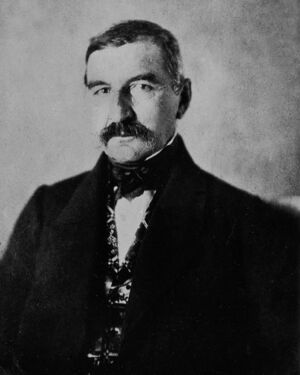Zoran Milaković
Zoran Milaković | |
|---|---|
 | |
| President of Syara | |
| In office 1 August, 1912 – 31 July, 1924 | |
| Preceded by | Penko Todorov Deliivanov |
| Succeeded by | Sasko Anastasov |
| Senator of Makedon | |
| In office 1 August 1902 – 31 July 1912 | |
| Personal details | |
| Born | 17 August, 1863 Parjov, Kingdom of Makedon |
| Died | 22 October, 1935 Zovahr |
| Nationality | Syaran |
| Children | 3 |
| Alma mater | University of Sena |
Zoran Milaković (17 August, 1863 - 22 October, 1935) was a Syaran politician and statesman who served as the President of the Republic of Syara from 1912-1924.
Born in the Kingdom of Makedon in 1863, Milaković grew up during the Unification of Syara and its aftermath. He graduated from the University of Sena in 1887 with a Master's in Political Science and served in the Makedonian government in various Realm Ministries from 1890-1900. In 1902 he successfully ran for the Republic Senate, becoming a Senator of Makedon in August the same year. He held a number of posts and positions within the Senate during his tenure, with the most significant being the Senate Committee on War during the Third Chryse War and again during the Syaran-Ruvelkan War. A member of the Federal Peace Party (Федерална мировна партија, Federalna mirovna partija or FMP), Milaković ran as the Party's nominee in the 1912 Presidential Election and won, becoming the 5th President of the Republic.
Describing himself as a "Preserver of the Republic" in light of depressed public sentiment following Syara's defeat against the Ruvelkan Socialist Republic, Milaković embarked on a number of ventures to increase Syara's industrial capacity and expand the reach of Syaran markets while remolding the Armed Forces of the Syaran Republic. He embraced initiatives to bring labor unions under national influence to curtail communist infiltrations from Ruvelka fostering welfare reform to further increase the Republic's popularity among the poor and peasantry. Following the outbreak of the Ruvelkan Civil War in 1914 Milaković positioned Syara to take advantage of the conflict to seize back control of Zemplen and Imerti as part of Syara's intervention. More extensive plans for involvement were derailed by worsening relations with the Cacertian Empire, which culminated in the Divide War in 1916. The outbreak of war allowed Milaković to secure a conditional victory in the 1916 election where he faced little opposition. The subsequent invasion of Makedon by Cacerta in the Desopya Campaign stunned Milaković, but Syara was eventually able to prevail and forced the Empire to withdraw from Syara entirely in late 1918.
Syara's unexpected victory over Tyran's premier superpower elevated Milaković's popularity and enthusiasm for the Republic to new heights. He easily won the 1920 election and continued to preside over an economic boon and military-industrial buildup, dominated by ultranationalist sentiment across Syara. Although he intended to run for a fourth term, an onset of health problems in 1922 raised questions about his health, and under pressure from FPP leadership agreed to endorse Sasko Anastasov as his successor. Milaković was succeeded by Anastasov in the 1924 election and declared himself retired from politics, however his improving health between 1929-1932 caused him to reconsider entering back into the political realm. He abandoned these plans after the start of the Siduri War, and died on 22 October 1935.
Milaković's legacy has undergone significant changes in public perception since leaving office. Initially hailed as the "Savior of the Republic", Milaković's reputation suffered due to his association with Anastasov's Presidency. It recovered somewhat as information revealed his personal distrust of his successor was found after his journals were published in 1949, and he remained generally popular for the remainder of the Republic. Modern scholarship is more divided, with criticism focusing on his failure to identify seemingly overt signs of the Cacertian Empire's path to war, and his deportations of ethnic Ruvelkans from the border regions.